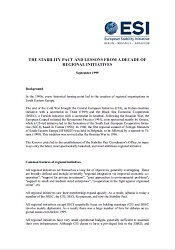CUTTING THE LIFELINE. Migration, Families and the Future of Kosovo
CUTTING THE LIFELINE. Migration, Families and the Future of Kosovo
Author(s): Author Not Specified
Subject(s): National Economy, Micro-Economics, Migration Studies
Published by: ESI – European Stability Initiative
Keywords: post-war Kosovo; money remittances; diaspora;
Summary/Abstract: If there is one universal conviction about post-war Kosovo, it is that its economy is fueled by remittances from the diaspora. Policy makers make the comfortable assumption that the diaspora and its fabled generosity will continue not only to plug a major gap in Kosovo’s balance of payments, but also to provide an informal social safety net for poor households, making up for the lack of a welfare state. || This paper argues that times are changing. Remittances have fallen significantly from their post-war high, when they funded the reconstruction of homes across Kosovo. The reason is clear. Since NATO intervention in 1999, migration has swung into reverse, as more than 100,000 Kosovo Albanian refugees have been obliged to return from Germany in particular. Furthermore, the door to continuing migration is now shut, with only the lucky few with close family in the diaspora still able to go abroad through family reunification schemes. As a direct consequence, fewer than 15 percent of Kosovo families now receive regular remittances, and all the signs are that this is decreasing. The lifeline that kept rural Kosovo afloat for the past generation is being cut. This is the legacy facing a post-status Kosovo. || This report contains an unwelcome message for EU member states: it is simply incoherent to invest hundreds of millions of euros in the stabilisation of Kosovo, and at the same time to slam the door so abruptly on any further migration. It is even more incoherent that this is happening to a small society like Kosovo (less than 2 million inhabitants) at the very moment when millions of Romanians, Bulgarians, Latvians or Poles are finding employment in different parts of the European Union. If Europe is serious about finding a lasting political solution for Kosovo, it will need to identify ways in which rural Kosovars can find temporary work abroad. The alternative is to send ever more policemen to Kosovo to deal with a new generation of angry and desperate young men.
Series: ESI Discussion Papers
- Page Count: 42
- Publication Year: 2006
- Language: English
- Content File-PDF

